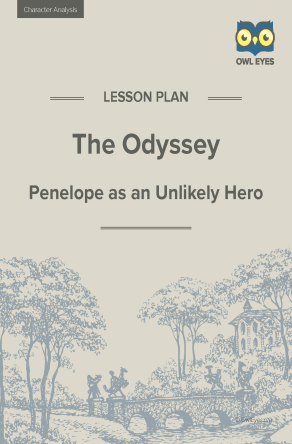The Odyssey Character Analysis Lesson Plan
- 23 pages
- Subject: Character Analysis, Conflict, Historical Context, Plot, Lesson Plans and Educational Resources
- Common Core Standards: RL.9-10.1, RL.9-10.2, RL.9-10.3, RL.9-10.6, SL.9-10.1
- Grade Levels: 9, 10, 11, 12
Additional The Odyssey Resources
Product Description
Penelope as an Unlikely Hero in Homer's Odyssey
This lesson explores the extent to which Penelope is empowered in The Odyssey. Students will analyze Penelope's agency within the poem and identify heroic traits in her character. Students will further analyze how her character advances the plot and contributes in developing Odysseus’s character. By studying Penelope's empowerment in a culture that diminishes women, students will be better able to describe her essential role in the epic.
Skills: close reading, character analysis supported with details from the text, drawing inferences from a text
Lesson Objectives: By the end of this lesson, students will be able to:
- identify and describe Penelope's character and position in the culture of Ancient Greece
- determine the extent to which Penelope is empowered and identify traits in her character associated with those of a Greek hero
- identify how Penelope’s actions advance the plot and contribute to the resolution of conflict in the epic
- analyze and explain how Odysseus’s character is further developed through his relationship with Penelope
About This Document
Owl Eyes lesson plans have been developed to meet the demanding needs of today’s educational environment and bridge the gap between online learning and in-class instruction. The main components of each plan include the following:
- An introduction to the text
- A step-by-step guide to lesson procedure
- Previous and following lesson synopses for preparation and extension ideas
- A collection of handouts and worksheets complete with answer keys
Each of these comprehensive, 60-minute plans focus on promoting meaningful interaction, analytical skills, and student-centered activities, drawing from the Common Core Standards for English Language Arts and the expertise of classroom teachers.
Introduction to the Lesson
One of the foundational texts of Western literature, The Odyssey was written at the end of the 8th century BCE. Homer’s epic follows the adventures of Odysseus, a Greek hero of the Trojan War, as he struggles for ten years to make his way home to Ithaca after the fall of Troy.
Odysseus’s troubles during his journey home begin with an act of hubris—out of pride, he insults the god Poseidon, who then punishes Odysseus by subjecting him to great challenges to overcome. With courage and determination, Odysseus employs strength and cunning to outwit the cyclops, defeat the sirens, and survive a foray into the underworld; once returned, he employs the same heroic traits to reclaim his home from the hundreds of suitors who have plagued his wife and squandered his property in his absence. By the end of his journey, Odysseus has demonstrated the character traits that establish him as the archetype of the hero in Western literature: a flawed, unwilling protagonist who heeds the call to adventure and survives trials and tribulations, conquering foes and psychological demons to return home, enlightened.
The structure of the epic poem consists of parallel plots developed in various settings. As Odysseus’s journey to Ithaca continues, his wife, Penelope, confronts conflicts at home, and his son, Telemachus, sets out on a quest to learn Odysseus’s fate. Penelope plays an essential role in Odysseus’s story, for her actions protect and preserve their marriage and ultimately enable him to slay the suitors and reclaim his position as husband, father, and ruler of Ithaca.
The Odyssey focuses primarily on Odysseus as hero, but Penelope demonstrates heroic traits as well. Although her status in Greek culture is diminished by her gender, a circumstance made evident in her relationship with Telemachus, who often bullies her, and in her inability to evict the suitors, whom she despises, Penelope emerges in the narrative as one of the first female heroes in Western literature, empowered by many of the same character traits that define Odysseus. Furthermore, through Penelope Homer imbues Odysseus with a tenderness that elevates his character beyond that of a fierce warrior. Considering Penelope’s subservient position as a woman in the culture of Ancient Greece, she is an unlikely hero in The Odyssey. However, her heroism is a major theme in the epic, and her character enriches the drama and the humanity in Homer’s poem.
Translation Note: There are many translations of The Odyssey available to modern readers. The Owl Eyes Library and this lesson plan use Samuel Butler’s prose translation, first published in 1900.
Worksheet Excerpt: Analyzing a Passage from Book I
Working as a group, read and discuss this passage from Book I. Discuss the questions over the passage, and write your responses on the handout. Select one student in your group to be the reporter and share the group’s findings with the class.
[Excerpted passage from Book I]
-
Why does Penelope tell Phemius, the bard, to sing a different song?
-
Describe how Telemachus exerts his authority over Penelope. What does his behavior suggest about her empowerment in this culture?
-
Which traits in Penelope’s character are revealed in the passage? How does she demonstrate them?
-
Based on the passage, in what ways is Penelope’s character similar to that of a Greek hero, such as Odysseus?







